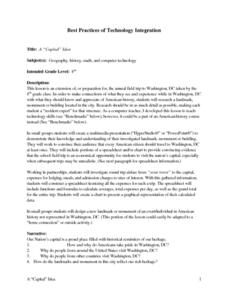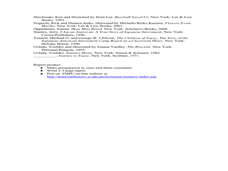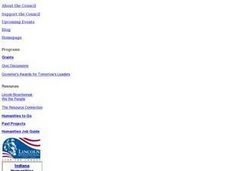Curated OER
A Date Which Will Live In Infamy
Learners use President Franklin D. Roosevelt's radio address following the attack on Pearl Harbor as a primary source to explain American reaction following the attacks. They explain how different Americans reacted to FDR's call for war.
Curated OER
History, Today and Every Day
Students assess, by analyzing historic New York Times front pages, how print journalism reflects the values and language of the society in which it is created.
Curated OER
A Date Which Will Live in Infamy
High schoolers analyze Franklin D. Roosevelt's "Day of Infamy" War Address. Students read the original first typed draft of the speech, and compare handwritten changes with the original to determine whether the changes strengthened or...
Curated OER
Abraham Lincoln
Students, in groups, use the Internet to research Abraham Lincoln. They role-play the part of a newspaper journalist and write an article about him.
Curated OER
Pioneer America: Journey West
Fourth graders experience pioneer life on the Oregon trail. In this pioneer lesson, 4th graders research the reasons for moving west and what life was like on the trail. They create a map, complete an oral presentation, and write about...
Curated OER
Cowboy Myth
Students explore the concept of historical myth. They read speeches by two presidents who allude to the mythic cowboy and they answer questions about the purpose of each speech. For homework, they read two historian interpretations of...
Curated OER
Democracy
Eleventh graders examine the denial of rights to individuals in the United States. In this American Government lesson, 11th graders study President Roosevelt's Day of Infamy speech. Students create a presentation on the denial of...
Curated OER
Executive Orders
Students interpret historical evidence presented in primary and secondary resources. In this foreign policy lesson, students examine U.S. foreign policies of Presidents since World War II. Students prepare PowerPoint presentations with...
Curated OER
Cuban Missile Crisis
Eleventh graders determine how causation shaped the Cuban Missile Crisis. In this Cold War instructional activity, 11th graders examine photographs and documents related to the crisis and analyze the television address that President...
Curated OER
American Thanksgiving Through Time
Students explore five web sites in order to identify the various ways Thanksgiving has been celebrated in the past and how it is celebrated today. They consider the diversity of United States and this affects celebrations of the day.
Curated OER
Grade 8 Unit 4
Eighth graders analyze aspirations and ideals of the people of the new nation, in terms of its physical landscapes and political divisions, and the territorial expansion of the United States during the terms of the first four presidents.
Curated OER
The Unfinished Lincoln Memorial
Students develop a list of images of President Abraham Lincoln: for example, self-taught youth, great debater, advocate of abolition of slavery and assassinated hero. They must determine if these images of Lincoln stand up under scrutiny.
Curated OER
The Pledge of Allegiance
Learners study the history of the Pledge of Allegiance. They investigate the First Amendment concept of separation of Church and state using Internet resources.
Curated OER
The Social Effects of the Great Depression
Students explore U.S. history by listening to an economics lecture. In this Great Depression lesson plan, students read a letter written to the President during the worst economical disaster in U.S. history. Students answer study...
Curated OER
Understanding The Progressives And Their Viewpoints
Eleventh graders explore the Progressive Era in American history (1900-1917). They use the internet and other sources to research the Progressive Movement, identify three Progressive presidents, and explore considered reforms. Students...
Curated OER
The Aleut Evacuation: An Overlooked Injustice
Students read and complete activities about the Aleut tribe and Russian impact on the people. In this Aleut and Russian history lesson, students read a passage about the history between the Russians and the Aleut tribe. Students write a...
Curated OER
Vietnam War: Kennedy Assassination
Students determine how the Kennedy assassination impacted the United States and, more specifically, the Vietnam War. In this 20th century American history lesson, students read books and view video clips of the event and then write...
Curated OER
Boundary Crossing
Seventh graders explore the issues that arose as a result of boundary crossing. For this US History lesson, 7th graders research supreme court cases in regards to crossing boundaries. Students present their findings to the class.
Curated OER
Emancipation Proclamation
Students analyze key components of a portrait and relate the elements to the historical context. In this lesson students evaluate the "Emancipation Proclamation" and it's significance.
Curated OER
Thomas Jefferson and the Declaration of Independence
Students examine readings and symbols to learn about the War of Independence and Thomas Jefferson. In this War of Independence lesson, students explore the role of Thomas Jefferson in the Declaration for Independence. Students answer...
Curated OER
A "Capital" Idea
Eighth graders prepare for a field trip to Washington, DC by researching landmark, monument, or building in Washington. They use the information in small groups to design a multimedia presentation. They include a spreadsheet that shows...
Curated OER
Lesson III: Crisis, Pearl Harbor, Internment
The third in a series of lessons introduced by “A Fence Away From Freedom,” uses the Smithsonian website, “A More Perfect Union: Japanese Americans and the U.S. Constitution” and focuses on the section of the presentation devoted to the...
Curated OER
Poetry of Abraham Lincoln
Fourth graders analyze Abraham Lincoln's poems "The Bear Hunt" and "My Childhood's Home" for word choice and deeper inquiry into the vocabulary he uses to convey emotion. They identify rhyming words and patterns in these poems. ...
Curated OER
The Nuclear Option
Students explore the history behind judicial nominations as well as the filibuster process. They discuss and debate filibuster merits and detractions, its use and alleged misuse, and what some Congressional leaders are currently doing...

























